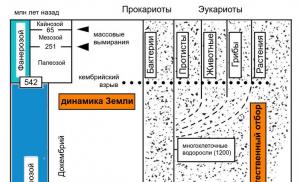English nouns with the suffix tion sion. Noun suffixes in English
Confusion may arise (both are often called word endings, “word endings”), and the English terminology in this matter is slightly different from Russian. So let's start with the basic concepts.
The ending is an inflectional morpheme. It changes the form of the word, but not its meaning, and at the same time carries a grammatical load:
- pencil - pencil s(the ending indicates plural)
- work - work ed(the ending indicates the past tense)
The suffix, in turn, is a word-forming morpheme. Suffixes in English create new words, either changing the meaning of the original one, or transforming one part of speech into another:
- red-redd ish(red - reddish)
- teach - teach er(teach - teacher)
There are very few endings in English - these are -s (-es), -ed and -ing. There are a huge number of suffixes in English. In this article we will consider only the most common ones.
Noun suffixes
Suffixes of professions and activities (-er, -ent, -ess)
The suffix -er is perhaps the most common and productive for denoting “doers.” With it you can form a noun from almost any verb.
- write > writer - write > writer
- bake > baker - oven > baker
- paint > painter - draw > artist
Majority modern words, denoting the performer of the action, are formed precisely with his help. This also applies to inanimate objects.
- printer - printer
- scanner - scanner
Many have the suffix -or:
- doctor - doctor
- tailor - tailor
- actor - actor
The suffix in English -ist often denotes activities related to science and medicine:
- scientist - scientist
- dentist - dentist
- biologist - biologist
It also denotes an adherent of any views and beliefs:
- pacifist - pacifist
- communist - communist
- realist - realist
Other suffixes in English for words of Latin and Greek origin:
Suffix -ian:
- musician - musician
- librarian - librarian
- mathematician - mathematician
Suffix -ent:
- student - student
- resident - resident, resident
- agent - agent
Suffix -ant:
- informant - informant
- assistant - assistant
- confidant - trusted person
The suffix -ess is one of the few "feminine" suffixes in English:
- waitress - waitress
- actress - actress
- princess - princess

Suffixes of process, action, phenomenon (-ment, -ion, -ism)
The suffix in English -ment is needed when forming verbal nouns and means an action or its result:
- movement - movement
- entertainment - entertainment
- concealment - concealment
The suffix -ion also means an action, a process, or the result of that process:
- revolution - revolution
- isolation - isolation
- restriction - restriction
The suffix -ism denotes a system of views and beliefs:
- racism - racism
- communism - communism
- pacifism - pacifism
Suffixes of state, quality, property (-ance / -ence, -dom, -hood, -ity, -ness, -ship, -th)
The suffix -ance/-ence on a noun generally corresponds to the suffix -ant/-ent on an adjective:
- different - difference (different - difference)
- important - importance (important - importance)
- independent - independence (independent - independence)
The suffixes in English -hood and -ship mean a person’s condition associated with his age, social relationships, and sometimes activities; or a group of people united by this condition.
- childhood - childhood
- motherhood - motherhood
- priesthood - clergy
- friendship - friendship
- internship - internship, internship

The suffix -dom means states and properties of a broader meaning:
- freedom - freedom
- wisdom - wisdom
- martyrdom - martyrdom
The suffix in English -ness means the possession of some quality and is used to form nouns from adjectives:
- kindness - kindness
- usefulness - usefulness
- vastness - vastness
The suffix -th more often means physical properties:
- strength - strength
- length - length
- warmth - warmth
The suffix -ity means property, quality, and is common for words of Latin origin:
- brevity - brevity
- velocity - speed
- purity - purity
Adjective suffixes
The suffix in English -ful means having a quality (and is related adjective full- "full"):
- beautiful - beautiful
- useful - useful
The suffix -less is the opposite in meaning to the previous one and means lack of quality:
- careless - carefree
- harmless - harmless
The suffix -able, -ible characterizes the property or availability for any action:
- edible - edible
- portable - portable, portable
- admirable - admirable
The suffixes -ic and -al mean “relating to, associated with something”:
- heroic - heroic
- mythic - mythical
- cultural - cultural
- musical - musical

The suffix -ous also carries the characteristic:
- dangerous - dangerous
- nutritious - nutritious
The suffix in English -ish has several meanings:
expresses similarity (in terms of appearance, behavior)
- girlish - girlish
- childich - childish, childish
- foolish - stupid
weakens the meaning of the adjective
- reddish - reddish
- narrowish - narrowish
means nationality, language or belonging to a country
- English - English
- Swedish - Swedish
The suffix -ive means having a property, ability:
- attractive - attractive
- sedative - sedative
The English suffix -y is used to form many simple adjectives:
- rainy - rainy
- dirty - dirty
- sunny - sunny
Verb suffixes
Verb suffixes are not so diverse and almost all have the meaning “to do something” or “to become something.”
Remember those moments in Russian lessons when you were asked to parse a word, identifying its prefix, root, suffix and ending? Perhaps this event only caused you headaches, but do not worry, in English everything will be different. Let's not analyze the entire morphological analysis at once, but consider only suffixes in the English language, which have many interesting features.
A suffix or simply a suffix of the English language is a morpheme for word formation in English , which usually comes after the root. In simple words, a suffix is one or more letters, thanks to which a word can change its part of speech, for example from a verb to a noun:
Or take on a different meaning altogether:
There are no specific rules regarding suffixes in English. That is, you cannot take one suffix, which, say, forms nouns, and use it with all words in a row. Suffixes are not always added to words that look similar or have the same letters at the root. However, a certain logic shines through in their use, and by knowing suffixes and their functions, you can learn to form words intuitively.
As mentioned earlier, English suffixes, like Russian ones, follow immediately after the root:
After suffixes there may be an ending:
The suffix may change if the word is used in the plural:
Having dealt with the peculiarities of the location and use of suffixes in a word, let’s move on to their types.
Suffixes in English: types
Suffixes can be used to form almost all independent parts of speech. Based on this, they are divided into 5 categories:
- Noun suffixes
- Verb suffixes
- Adjective suffixes
- Adverb suffixes
- Numeral suffixes
Let's look at each group separately. Please note that there are very, very many suffixes in the English language, and therefore we will consider only the most used of them.
Noun suffixes
The group of suffixes for forming nouns is perhaps the most voluminous. These include:
- -er / -or:
- participate in the formation of inanimate nouns from verbs. Table for clarity:
- and also in the formation of nouns expressing the person who does what the verb denotes. To make it clearer, let's look at examples:
Often these suffixes are used to form words denoting professions:
- -ess (-ress):
- A couple of these professions can be used together with the suffix -ess (-ress), perhaps the only feminine suffix used in English:
- In addition to professions, the following nouns can be modified using a suffix:
- -ee– a suffix that is used to show the person to whom the action is directed, that is, this suffix is the opposite of the suffixes -er and -or:
- -ian– another suffix with which you can express the type of activity. Words are formed from nouns, examples:
Suffixes perform the same functions:
- -ent/-ant:
- -ist is usually used with professions related to the scientific field:
And with music:
Although this suffix is often found in nouns that express supporters of certain views and their perception of the world. In this case, the English suffix performs the same function as the Russian suffix -ist, forming almost identical words:
- -ism– another English suffix that is similar to Russian -ism. It denotes concepts associated with ideological trends and beliefs of a person:
- -ion- an interesting suffix, thanks to which you can once again Confirm your knowledge of English. The fact is that all words that end in “-tion” in Russian use the suffix -ion in English. See for yourself:
If the suffix is preceded by a double s, then instead of words starting with “-tsia”, you can safely select words starting with “-iya”:
| expression |
| aggression |
| commission |
| mission |
| percussion (percussion) |
| depression |
Just like that, you just increased your vocabulary by several hundred words.
- -ment– a suffix expressing processes and results. As a rule, it is formed from verbs:
- -ence / -ance– suffixes that form nouns similar to the meaning of adjectives with the suffixes -ent / -ant:
- -dom denotes abstract concepts, states, possessions:
- -hood– suffix of nouns that imply the stages of life and state of a person or group of people:
- —ship usually used with nouns that show a group of people related by a state or action:
- -age expresses collective concepts, facts, actions:
- -ness– a suffix that forms nouns from adjectives denoting qualities:
- -th, typically used to express physical characteristics:
- —ity– properties, qualities, abstract concepts. Often formed from adjectives:
- Separately, it is worth considering diminutive suffixes in English. It is often said that they simply do not exist in the English language. Actually this is not true. Yes, they are very rare. However, there are quite a lot of them and it is worth knowing them to avoid misunderstandings. Diminutives include:
- -let:
- —ling:
However, be careful when using the two above-mentioned suffixes, because sometimes their meaning can change from positive to negative, and your comment may be regarded as ridicule:
- -kin:
- -ock:
- -ule:
- -cule:
- -ette:
- -y with a double consonant before it:
- -ie:
- -rel:
Verb suffixes
Although verb suffixes in English are found quite often in speech, they are not particularly diverse. So, verbs include:
- -en:
- -ate:
- -ify:
- —size(-ise):
Adjective suffixes
Adjectives have slightly more suffixes:
- -full, shows the possession of quality:
- —less– lack of quality:
- —able / -ible show possibility, property, suitability:
- —al / -is form adjectives from nouns:
- —ish can express similarity of behavior or species, nationality, as well as a weak degree:
- —ous shows the characteristics of a noun:
- —ive expresses ability, property. Formed using verbs and nouns.
- -y– to form short adjectives with different meanings:
Adverb suffixes
Everything is much simpler, because there are only four suffixes for their formation:
- -ly, adverbs are formed from adjectives:
- -wise expresses a way or direction. Most often formed from a noun or adjective:
- -ward(s) / way(s) show directions:
- -ty expresses tens:
It is worth noting that, unlike Russian, English suffixes, as a rule, are not used in one word at the same time. That is, if in Russian you can use one, two or several suffixes at once, in English you can only use one. In addition, some functions of suffixes can be performed by prefixes in English or so-called prefixes. So, for example, many diminutive suffixes can be replaced with the prefix mini- (mini-). Therefore, choose the option that you like best or that more accurately conveys the meaning.
We hope that now you do not have any questions regarding suffixes in English. Yes, English suffixes quite a lot, and therefore it will be quite difficult to remember them at once. Instead, study a few suffixes a day and reinforce what you've learned through exercises and writing sentences or lists of words with specific suffixes. In addition, when reading, try to pay attention to the formation of words, note for yourself which suffix is used in a particular case and what function it performs. Return to this page periodically to review the material.
Views: 298
There are several suffixes in the English language that tend to cause spelling difficulties. Why? Because they sound the same. Compare noun suffixes «– ance» And «– ence» .
import ance/ɪmˈpɔː(r)t(ə)ns / intellig ence/ɪnˈtelɪdʒ(ə)ns/
As can be seen from the examples, their pronunciation is the same - / (ə) ns/ .
What do the suffixes –ance and –ence mean?
Both suffixes are used to form nouns indicating quality or condition. For example,
ignorance (ignorance, ignorance, lack of information) And emergence (appearance, emergence, rise)
Nouns with suffixes – ance And – ence formed from verbs (to perform – performance) and from adjectives (intelligent – intelligence)
Why does the problem of choice arise?
The problem is explained by the fact that in English most suffixes are in unstressed position, so the vowel sound in both suffixes (— ance/ — ence) reduced and pronounced — / ə / .
What suffix to choose in writing?
Of course, if you don't know how to spell a word, you should look up its spelling in a dictionary. But there are a few simple rules that will help you navigate the spelling of words.
Suffix "-ance»
- If a noun is formed from a verb that ends in «- y», «- ure», «- ear» , then the noun should be written with the suffix «– ance» .
|
Verb |
Noun |
|
appl y |
appli ance(device, device) |
|
compl y |
compli ance(agreement, acceptance) |
|
var y |
vari ance(divergence, fluctuation) |
|
ass ure |
assur ance(assurance, guarantee. self-confidence) |
|
end ure |
endur ance (endurance, strength, duration) |
|
ins ure |
insur ance (pageinsurance, guarantee) |
|
app ear |
appear ance(appearance, occurrence) |
|
cl ear |
clear ance (cleaning, clearing) |
|
forb ear |
forbear ance(endurance, restraint, long-suffering) |
- If the verb from which the noun is formed ends in «– ate» , then the noun will usually have the suffix «– ance» . For example,
- If the stem of the word ends with a letter "With", which is pronounced like / k/ or by letter « g» , which is pronounced like « g» , then the noun will end with «- ance» :
arro g ance (arrogance, arrogance)
signify c ance (importance, importance)

Unfortunately, the above rules are not universal and most nouns have to be memorized. Here are the most common words:
Abund ance
Accept ance
Acquaint ance
Assist ance
Circumst ance
Disturb ance
Fragr ance
Guid ance
Ignore ance
Inherit ance
Mainten ance
Perform ance
Resembl ance
Resist ance
Utter ance
Vengea nce
Suffix"-ence"
If a noun is formed from a verb ending in «- here» , you should write the suffix «- ence» .
For example,
If the verb ends in «- er» , which is under stress, then the noun formed from it should have a suffix «- ence» :
Suffx «- ence» also written in nouns if the verb stem ends in « cid», « fid», « sid», « vid» . For example,
Сonfid ence
Evid ence
Incid ence
Resid ence
If the stem of a noun ends in "With", which is pronounced like / s/ or on « g» , which is pronounced like / dʒ/ , the suffix should be written in words «- ence» :
Adolesc ence
Innoc ence
Intellig ence
Lic ence
But not all words fall under these rules. Here is a list of the most common words with the suffix «- ence» :

Abs ence
Afflu ence
Audi ence
Benevol ence
Compet ence
Consci ence
Consequ ence
Conveni ence
Depend ence
Differ ence
Eloqu ence
Excell ence
Experi ence
Influ ence
Obedi ence
Pati ence
Preceded ence
Sequ ence
Sil ence
Viol ence
So, we introduced you to the rules for using noun suffixes - «- ance» And «- ence» . Although English spelling is replete with "underwater reefs", we hope that this publication will help you write correctly. Good luck!

The English sentence is like an impenetrable forest, we took a wrong turn, and now we are lost among unfamiliar words. How can you avoid getting into trouble and correctly determine which part of speech is in front of you? Suffixes to the rescue! We have prepared useful material especially for you, thanks to which you will distinguish these mysterious parts of speech. Understanding the meanings of common affixes will help you understand the meanings of new words you come across. Let's go
So, by suffix we mean a letter or group of letters that is typically found at the end of a word in English. Thanks to this element, amazing metamorphoses occur, so a completely new one is formed from the original word, and sometimes the part of speech changes. Let's look at an example, the verb to create (create), by adding the suffix - or we get the noun creat or(creator). Let's construct an adjective in a similar way, but this time we choose the suffix - ive:creat ive(creative).
Since practicing and creating vocabulary is a useful task, we suggest paying attention to three important features:
First, sometimes adding a suffix changes the spelling of the root or stem. The word ends with a vowel -y, and is preceded by a consonant - y replace with - i. Here's an example:
- verb to justify y(to justify) > adjective justif i able (justified);
- adjective ugl y(ugly) > noun ugl i ness (ugliness).
Also, if by the way with a dumb word - e an affix is added at the end, then this vowel is simply falls out. For example:
- verb to us e(use) > adjective usable(practical);
- verb to adore e(adore) > adjective adorable(charming).
NOTA BENE: As with all rules of the English language, spelling, of course, has its exceptions. Therefore, if controversial questions arise, feel free to consult the dictionary.
Secondly, not all suffixes can be added to all roots, these are the owners of affixes, and there’s nothing you can do about it. For example:
- beauty y(beauty) + - ful > beautiful(beautiful);
- ugl y(ugly) + - ness > ugliness(ugliness).
But the words beauty or ugliful are not in the dictionary, since they do not exist in the language at all, period.
Thirdly, some suffixes have more than one meaning. How greedy! You all know the affix - er used comparatively: bright > bright er(brighter). However, the same suffix also means a person living in a specific place: London (London) > Londoner (resident of London).
Verb suffixes in English
An English verb, like any verb, means the state or action of an object or thing. The verb suffix is quite unpretentious and has the following meanings: happen, become, do or create.
NOTA BENE: Many verbs with the suffix - size, can also end with - ise. For example: real size& real ise(realize) or patron size& patron ise(take care). Two options occur, however, the verb suffix is - ise will use British. While - size use more Americans.
| SUFFIX | MEANING | EXAMPLES |
|---|---|---|
| ate | become happen |
regulate ["regjəleɪt] - regulate eradicate [ɪ"rædɪkeɪt] - exterminate enunciate [ɪ"nʌn(t)sɪeɪt] - to expound repudiate - to reject evaporate [ɪ"væp(ə)reɪt] - evaporate |
| en | become happen |
harden ["hɑ:d(ə)n] - harden soften ["sɔf(ə)n] - soften enlighten [ɪn"laɪt(ə)n] - to enlighten strengthen ["streŋθ(ə)n] - strengthen loosen ["lu:s(ə)n] - loosen |
| size / ise | become happen |
civilise ["sɪv(ə)laɪz] - to civilize humanize ["hju:mənaɪz] - soften economise [ɪ"kɔnəmaɪz] - save utilize ["ju:tɪlaɪz] - spend valorize ["væl(ə)raɪz] - increase prices |
| ify/fy | do create become |
satisfy ["sætɪsfaɪ] - to satisfy rectify ["rektɪfaɪ] - to correct terrify ["terɪfaɪ] - to terrify exemplify [ɪk"semplɪfaɪ] - illustrate clarify ["klærɪfaɪ] - clarify |
Noun suffixes in English
A noun denotes some object or thing. The English noun suffix is distinguished by its diversity and includes the following elements: character, quality or condition, process or activity, etc.
NOTA BENE: If the verb ends in - here, but the noun will have a suffix - ence: to interfere > interfere ence(interference). If on - ate, -y, -ure / -ear, then the affix - ance: to devi ate(deviate) > devi ance(deviation); to appl y(apply) > appli ance(device); to cl ear(clear) > clear ance(cleaning).
| SUFFIX | MEANING | EXAMPLES |
|---|---|---|
| ance / ence | state quality action |
extravagance [ɪk"strævəgən(t)s] - quirk preference ["pref(ə)r(ə)n(t)s] - preference utterance ["ʌt(ə)r(ə)n(t)s] - pronunciation |
| acy | state quality |
fallacy ["fæləsɪ] - cunning celibacy ["seləbəsɪ] - celibacy |
| ity/ty | quality characteristic |
probity ["prəubətɪ] - honesty royalty ["rɔɪəltɪ] - greatness |
| ment | state means result |
endorsement [ɪn"dɔ:smənt] - approval fragment ["frægmənt] - fragment excitement [ɪk"saɪtmənt] - excitement |
| al | action process |
recital - transfer denial - refusal |
| dom | state status |
boredom ["bɔ:dəm] - melancholy earldom ["ɜ:ldəm] - count's title |
| ness | state | preparedness - readiness wilderness ["wɪldənəs] - desert |
| xion / sion / tion | state action |
fluxion ["flʌkʃ(ə)n] - change concession - recognition relation - relationship |
| hood | characteristic interest group current state |
womanhood ["wumənhud] - femininity brotherhood ["brʌðəhud] - brotherhood childhood ["tʃaɪldhud] - brotherhood |
| ship | current state interest group |
|
| ship | current state interest group |
membership ["membəʃɪp] - membership friendship ["frendʃɪp] - friendship |
| ist | character | narcissist ["nɑ:sɪsɪst] - “narcissist” novelist ["nɔv(ə)lɪst] - novelist |
| ee | character | addressee [ædre"si:] - recipient employee [ɪmplɔɪ"i:] - employee |
| ess | female character | goddess ["gɔdes] - goddess waitress ["weɪtrəs] - waitress |
| ism | ideology action and result language features |
hedonism ["hi:d(ə)nɪz(ə)m] - hedonism exorcism ["skeptɪsɪz(ə)m] - skepticism Americanism [ə"merɪkənɪz(ə)m] - Americanism |
Adjective suffixes in English
An adjective is a part of speech that modifies a noun. The main meanings of the suffix include the following: absence or presence of quality, characteristic, ability, opportunity, etc.
| SUFFIX | MEANING | EXAMPLES |
|---|---|---|
| able / ible | capable possible important |
payable ["peɪəbl] - payable edible ["edɪbl] - fit for food fashionable ["fæʃ(ə)nəbl] - secular |
| al | relating to | autumnal [ɔ:"tʌmn(ə)l] - autumn accidental [æksɪ"dent(ə)l] - random |
| ic/ical | relating to | metallic - metallic Finnic ["fɪnɪk] - Finnish |
| esque | related to style manner or image |
arabesque [ærə"besk] - decorated picturesque - picturesque |
| ful | having quality characterizing |
masterful ["mɑ:stəf(ə)l] - self-willed woeful ["wəuf(ə)l] - sorrowful |
| ious / ous | having quality characterizing |
cautious ["kɔ:ʃəs] - careful nervous ["nɜ:vəs] - nervous |
| y | having quality characterizing |
sticky ["stɪkɪ] - sticky nerdy ["nɜ:dɪ] - boring |
| ive | having quality characterizing |
palliative ["pælɪətɪv] - softening corrective - corrective |
| ish | having quality characterizing to some extent |
girlish ["gɜ:lɪʃ] - girlish snobbish ["snɔbɪʃ] - snobbish pinkish ["pɪŋkɪʃ] - pinkish |
| less | lack of quality without anything |
skinless ["skɪnləs] - without skin childless ["tʃaɪldləs] - childless |
Adverb suffixes in English
An adverb is an irreplaceable part of speech that conveys a sign of a state or action primarily of a verb. The adverb suffix is modest and has only three meanings: direction or direction, characteristic or attribute, relation of one to another.
Conclusion
So, we have looked at the most common suffixes different parts English speech. Think of the affix as a clue to the meaning of words. As in any detective story, sometimes the clues are visible to the naked eye and are quite obvious. In other cases, they can be confusing or misleading.
In any case, keep in mind that the meanings of words are best determined by examining the context in which they are used. We hope that this article was useful and informative for you.
We wish you success and development in English!
Big and friendly EnglishDom family
Here is material that illuminates SUFFIXES OF ENGLISH ADJECTIVES.
Exercise Rules
Suffix -able (-ible) forms adjectives with the meaning of possibility of implementation or having some quality, most often forms adjectives from verbs, the Russian equivalent of which is adjectives with a suffix -name:
acceptable - acceptable
comfortable - convenient
readable – which can be read, readable (not: readable)
detectable – which can be detected, detectable (not: detectable)
observable – which can be observed (not: observable)
These suffixes represent big problem for language learners. General guidelines for choosing between -able and -ible are given below (there are quite a few exceptions). In some cases, these recommendations do not help, and best way– remember the spelling of these words, placing them in two columns for comparison. Note that there are more adjectives with the suffix -able than with the suffix -ible.
1. if the verb ends in -e, then when adding the suffixes -able, -ible, this letter -e disappears:
to receive – receivable (which can be received)
2. if the verb ends in -v, then when forming an adjective, -y changes to -i:
to rely (to rely on something/someone) – reliable (on which you can rely)
3. only -able can be used after the letter -i:
amiable - friendly
appreciable - tangible
4. only -able can be added to a word that ends in a syllabic -y. Replace the letter -y with -i before adding -able:
to deny – deniable controversial
Suffix - al forms adjectives from nouns with the meaning of similarity, resemblance, possession of some similarity:
additional - additional
accidental - random
Suffixes -an (-inn, -ean) forms adjectives and nouns with the meaning of belonging to a certain nationality, clan.
Arabian - Arabian, Arabic
Georgian - Georgian, Georgian
Suffixes -ant, -ent forms adjectives from verbs with the meaning of property:
observant - observant
relevant – relevant, relevant
current – current, modern;
evident - obvious
1. Derived adjectives and nouns have the suffix -ant, if the noun has the suffix -ance or -anсy:
arrogant - arrogance
2. Derived adjectives and nouns have the suffix -ent if the noun has the suffix -ense or -enсy:
intelligent – intelligence
Suffix -ar forms adjectives from nouns with the meaning of similarity or resemblance:
similar – similar, similar
Suffix -ау forms nouns with the meaning of action, process and result, as well as in borrowings from French and Spanish:
secondary - second
opposite - opposite
Suffix -ate found in adjectives with a variety of meanings:
moderate - moderate, seasoned
adequate – appropriate, adequate
Suffix -ed forms adjectives:
a) with the meaning of any attribute or possession of something: propertied - possessor, possessing property;
b) denoting any shape: arched – curved;
c) denoting character or state: educated - educated.
This suffix is often found in compound adjectives:
many-sided - multilateral
ill-informed - incorrectly informed.
Suffix -en means made of something:
wooden – wooden
golden – golden
Suffix -ese forms adjectives with the meaning of the nationality of geographical names:
Japanese - Japanese
Chinese - Chinese
Suffix -ern forms adjectives from the names of the countries of the world.
North north – northern northern
South south – southern southern
West west – western western
Fast east – eastern east
Suffix -fill forms adjectives with a certain quality:
beautiful – beautiful
wonderful – amazing, amazing
Suffixes -ic, -ical form adjectives from nouns with scientific meaning:
scientific - scientific
electronic - electronic
Suffix -ior passes comparison:
junior - junior
prior – previous
Suffix -ish found in a number of nationalities:
British British
Spanish Spanish
This suffix also means quality in a weak degree.
reddish – reddish
longish – longish
Suffix -ive denotes belonging to something:
native – local, native
creative - creative
Suffix -less denotes adjectives meaning “devoid of something”:
helpless - helpless
tactless - tactless
Suffix -lu forms adjectives from nouns:
friendly - friendly
hourly - hourly
manly – courageous
Suffix -ous denotes adjectives with the meaning “possessing some characteristic”:
dangerous - dangerous
curious - inquisitive
Suffix -у forms adjectives with the meaning “having the quality of what is indicated by the stem”:
funny - cheerful, funny
pretty – pretty; enough, enough
dirty - dirty













